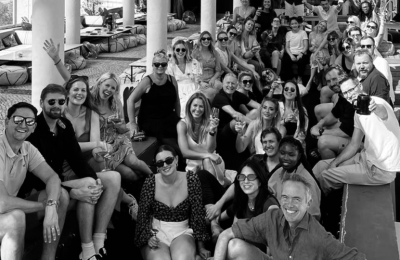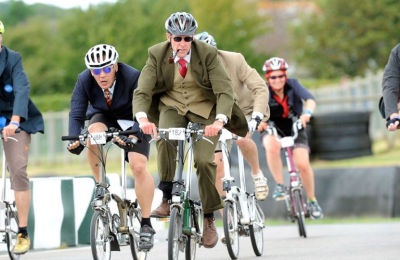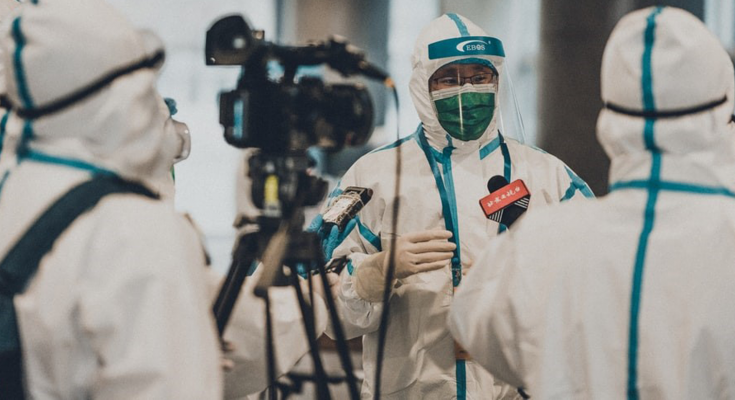Emily Koppit, Group Account Lead at The Producers Live discusses the short and long-term impact COVID-19 is having and will continue to have within the Events Industry across the globe with Wesley Pierce, Managing Director of Number 8 Events, a leading expert in health & safety at events.
We have seen the events industry (at least in real life) disappear due to the need for social distancing in the current phase of the pandemic. We are all aware of the impact and need to Stay Home, however, beyond the financial impact of COVID-19 on the events industry, there is a wider issue being raised by the lack of events across the world.
Isolation in some cases and social distancing for everyone has raised concerns around the impact the lack of human connection is having and will have on the world’s population, a role live events and experiences have increasingly played in our lives. In this time of COVID-19, many of our clients and the wider world are wanting to understand how they can be helpful and genuinely connect and communicate with people.
The beauty of live events has always been the connection between people and the key to the situation now is finding a way of harnessing this connection and translating it (as best we can) into a virtual format.
With the time frame of COVID still remaining largely unknown, virtual events need to be investigated not just for an interim solution whilst in isolation, but as a longer-term solution alongside live events for the next few months whilst we deal with the long tail of social distancing coming out of this pandemic.
But it’s an exciting time, ironically as there are so many technologies; both existing and brand new that will help recreate this connection. We, alongside a lot of our peers, have been working on how these different technologies can help brands to help people, but perhaps more importantly for us to help each other.
One of the key things brands can do for people when it comes to events, for the time being at least, is to deliver an opportunity for people to enjoy staying home a little more and utilise the creativity they would bring to live events to interacting with people in their homes using new and innovative solutions so that we can all get back in that field, at that breakfast or at those gigs and shows we are missing ASAP.
With that in mind, Wes, what do you see the impacts on the Events industry being when social distancing starts to relax?
WP: Our expectation is that restrictions will remain in place for the event industry reasonably longer than they do for other industries given events are designed to bring people together, often from different geographical areas. The focus will be the social benefit events offer vs the risk to the population from Coronavirus.
EK: Are there events that will likely see longer-term impacts than others?
WP: We don’t yet fully understand how the virus spreads, so the restrictions in place are based on our current understanding of similar viruses. As time goes on, we will learn more and be able to understand better what infection prevention measures are most effective. It is inevitable that this will impact some events more than others, particularly gatherings of 100 people.
It is hard to imagine that events will be able to resume unrestricted while regions or entire countries are still dealing with outbreaks or epidemics respectively.
Ultimately, to allow people to attend events freely there needs to be a degree of confidence that we are not importing cases and causing new outbreaks having only just brought the UK epidemic under control. What government does next is likely to have an impact on this.
For example, will they move to a test and trace system such as what is being seen in Asia and more importantly, of such systems, will it be compulsory for event organisers to implement them, and at what cost?
EK: Are there ways we could be preparing now for when we are allowed to hold live events again?
WP: We are working with clients to develop systems to reduce the risk of spreading the virus. This is based on a combination of trying to prevent infected individuals from attending events, promoting good levels of personal hygiene and establishing how best to deal with a suspected case at an event.
As and when the industry starts to move again, which it is poised to do, it will be important that appropriate measures are easily and effectively implemented during the planning, live and post-event period.
Checklists and staff training should be encouraged so that you can review the effectiveness of the actions periodically at senior level and make changes as required. It will also help demonstrate what was done if ever there is criticism or an investigation. Events are big business and keep many of us employed, so the sooner we can justify them continuing without posing a risk to others the better.
EK: Are there any positives we can take from the pandemic that we should carry forward when planning events?
WP: Obviously, there will be a tragic loss of life which we cannot escape. The hope is that through a combination of testing and tracing, improved treatments and eventually a vaccine, the virus will become manageable by governments and healthcare systems around the world. It goes without saying that there will also be businesses and clients who struggle or fail to stay the course.
Whilst the circumstances are different, valuable lessons were learnt following the 2008 financial crisis. By thinking back to what worked then – how businesses, clients and events found their feet and grew over the next 10years – should give us all some much-needed encouragement that this won’t last forever and we can emerge stronger and better prepared than we were before.
Many of us will be used to seeing pandemics on risk assessments, although it is fair to say that we will probably not have imagined it happening to us on this scale. One thing we can be sure of is that we will learn what works best and be better prepared for the next one.
EK: Thanks, Wes. As the entire industry considers what the future looks like for events, it’s clear we need to be poised and ready to work through what the future of events looks like both during and after the current pandemic, and by working through it in various ways:
- Looking at virtual events and what we can do now to keep human connection during social distancing
- Consider the longtail out of the pandemic and how the combination of virtual and live events will become a key factor whilst the world returns back to the new normal
- Put the correct plans in place to justify and confirm the need and safety of events for the quickest possible return to live events being held.




















